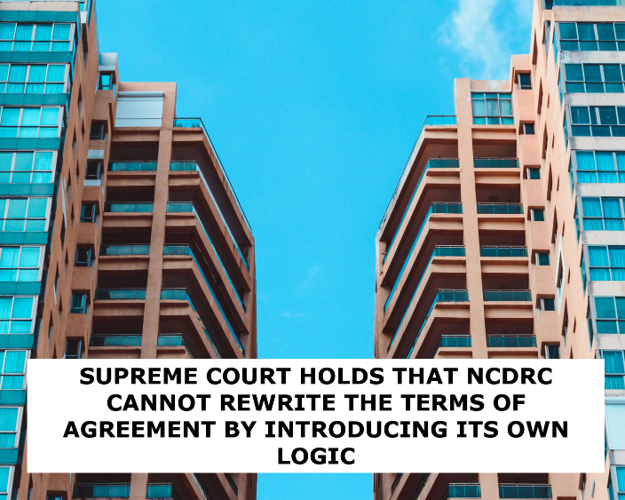SUPREME COURT HOLDS THAT NCDRC CANNOT REWRITE THE TERMS OF AGREEMENT BY INTRODUCING ITS OWN LOGIC
A two Judge Bench of Supreme Court comprising of Justice Aniruddha Bose and Justice Sanjay Kumar passed a judgement dated 22.02.2024 in Venkataraman Krishnamurthy and Anr V. Lodha Crown Buildmart Pvt. Ltd. Civil Appeal no. 971 of 2023 held that it was not open to the National Consumer Disputes Redressal Commission (NCDRC) to apply its own standards and determine that, while there was a delay in giving possession of the Apartment, the delay was not excessive enough to invalidate the Agreement. It was not up to the NCDRC to rewrite the terms and circumstances of the contract and apply its own subjective criteria to determine the course of action to be taken by either party.
Facts
i) The Appellants were the Complainants who wanted to buy an Apartment in a block being built by the Respondent Company in Mumbai. The Parties signed an Agreement to Sell, and the Respondent Company decided to provide possession of the Apartment by 30.06.2016. According to the payment plan, the sale consideration of Rs. 7,55,50,956/- was to be paid in four instalments. At the time of start of fit outs, Rs. 5,83,53,615/- was due and payable. According to the Agreement, possession of the Apartment was to be given to the Complainants for fit outs by 30.06.2016, with a one -year grace period.
ii) The Complainants alleged that the Company did not deliver the possession of the Apartment for fit outs by the aforesaid date and as a result, the Complainants terminated the Agreement. The Complainants filed a Complaint bearing 35 of 2018 and approached the NCDRC regarding their grievances and prayed for refund of the amount paid by them with a compound interest of 18% along with compensation for the harassment, mental agony, and torture suffered by them apart from litigation costs.
iii) The NCDRC, disposed of the Appeal, vide Order dated 09.11.2022, by directing the Respondent to provide the possession within 3 months and compensation to the Appellant in the form of simple interest @ 6% p.a. on the total amount paid from the committed date of possession as per the Agreement dated 30.06.2016 till the date of offer of possession e. 29.11.2017.
iv) The Respondent relied on Clause 11.2 of the Agreement stating that they delivered the ‘Occupation Certificate’ to the Appellant’s Apartment on 08.06.2017, which was well before the expiry of the grace period, and it had called upon the Appellants by E-mail on the very same day to make the balance payment in order to initiate the possession process. It was alleged that the Appellants had failed to make the balance payment and thus were in default. Further, relying on Clause 11.2, which provided that the date on which the Occupation Certificate is issued shall be deemed to be the date of offer of possession and thus, contended that the Appellants could not claim that possession of the Apartment was offered to them before expiry of the grace period.
v) The NCDRC upon hearing the matter concluded that though there was delay in handing over possession of the Apartment, such delay was not unreasonable enough to warrant cancellation of the Agreement. The NCDRC further opined that in the event the Complainant wished to seek a refund, the Respondent-Company was entitled to deduction/forfeiture of the earnest money as per the provisions of the Agreement. Moreover, the NCDRC observed that the Respondent-Company was still bound to provide actual physical possession of the Apartment, complete in all respects. NCDRC also issued directions to the Complainant that he shall be liable to pay service tax or any other applicable taxes to the Government Authorities within 45 days.
Issues
I) Whether the NCDRC had overstepped its jurisdiction?
II) Whether there was sufficient delay by the Respondent in providing the possession warranting termination of Agreement by the Complainants?
Decision by the Supreme Court
The Apex Court relied on the Constitution Bench decision in General Assurance Society Ltd. vs. Chandumull Jain and another[1], wherein it was observed that, in interpreting documents relating to a contract of insurance, the duty of the Court is to interpret the words in which the contract is expressed by the Parties because it is not for the Court to make a new contract, however reasonable, if the Parties have not made it themselves.
The Respondent issued a ‘Part Occupancy Certificate’ to the Appellants and contended that they have issued ‘Occupancy Certificate’ to the Appellants. The said thing was clearly misconstrued by the NCDRC and the Hon’ble Supreme Court held that the ‘Part Occupancy Certificate’ cannot be equated with the ‘Occupancy Certificate’. Thus, the Respondent-Company’s argument that issuance of the afore-stated Certificate should be construed to mean that there was no delay on its part in delivering possession of the Apartment, was utterly misconceived by NCDRC.
The Supreme Court held that although the Appellants had accepted and acquiesced with its proposal to dispense with delivery of possession of the Apartment for fit outs, the Apex Court did not find merit in the contention of the Respondent.
Thus, by analysis of the facts of the case, the Bench held that NCDRC overstepped its jurisdiction by ignoring the binding covenants in the Agreement and introducing its own logic and rationale to decide as to what would be the future course of action of the Parties and more particularly, the Appellants.
Conclusion
The Supreme Court allowed the Appeal and set aside the Order dated 09.11.2022 passed by the NCDRC. The Apex Court allowed Consumer Complaint No. 35 of 2018, directing the Respondent-Company to refund the deposited amount of Rs. 2,25,31,148 /- in twelve equal monthly instalments with simple interest of 12% p.a., from the date of receipt of the said amount or parts thereof till actual repayment to the Appellants.
Arjav Jain
Associate
The Indian Lawyer & Allied Servuces
[1] 1966 AIR 1644, 1966 SCR (3) 500, AIR 1966 Supreme Court 1644





































Leave a Reply